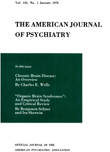INSULIN SHOCK THERAPY, A STATISTICAL SURVEY OF 393 CASES
Abstract
1. Insulin shock therapy was found to be effective in the treatment of 182 cases of schizophrenia in the following terms : discharged from the hospital, 34.1% ; remained discharged after a period of 21 to 75. months, 19.8% ; and full social recovery (after that period of time) estimated at about 6%. These figures indicate that insulin shock therapy is certainly not sufficient as a sole form of treatment in schizophrenia. It may have more value when used as a preliminary approach to psychotherapy or milieu therapy. On the other hand the low social recovery rate, after 40 months (average) of evaluation, is discouraging.
2. Race was not a significant factor in this form of therapy.
3. The older the patient the better the remission status following therapy, i. e., fewer relapses occurred.
4. There was no indication that insulin shock therapy is especially effective in any particular type of schizophrenic reaction.
5. The effectiveness was found to decrease as the length of illness prior to therapy was increased.
6. Of 182 schizophrenic patients showing remission after a course of insulin shock therapy as the first form of shock treatment, 41.9% later suffered relapses, within a time evaluation period averaging 3⅓ years.
7. Insulin shock therapy was effective in some patients (17.0% of cases) who had failed to respond with electroshock treatment. 8. Electroshock therapy was effective in some patients (15.0% of cases) who had failed to respond with insulin treatment.
9. A second course of insulin treatment was found to be of very little value if the patient had failed to respond with the first course.
10. The level of the fasting blood sugar prior to insulin shock therapy had no effect on the outcome of the treatment.
11. Almost invariably a substantial gain in weight was produced during the course of insulin shock therapy. This had little bearing on the ultimate improvement of the patient.
12. The length of treatment was of no value in estimating the prognosis.
13. Convulsive attacks during insulin coma seemed to have a favorable therapeutic effect.
14. There was no marked change in blood pressure following insulin shock therapy.
15. Paranoid schizophrenics required a smaller dosage of insulin to produce symptoms of hypoglycemia than did the other types of schizophrenia.
16. Insulin shock therapy can be expected to produce certain complications and a mortality rate of about 0.5%.
Access content
To read the fulltext, please use one of the options below to sign in or purchase access.- Personal login
- Institutional Login
- Sign in via OpenAthens
- Register for access
-
Please login/register if you wish to pair your device and check access availability.
Not a subscriber?
PsychiatryOnline subscription options offer access to the DSM-5 library, books, journals, CME, and patient resources. This all-in-one virtual library provides psychiatrists and mental health professionals with key resources for diagnosis, treatment, research, and professional development.
Need more help? PsychiatryOnline Customer Service may be reached by emailing [email protected] or by calling 800-368-5777 (in the U.S.) or 703-907-7322 (outside the U.S.).



